
Dental Hygienists Reflect on the Value of Professional Organizations
By Kirsten Mickelwait
It’s no secret that alumni, faculty and students of the Arthur A. Dugoni School of Dentistry are leaders in their respective professional communities. One of the most important ways this leadership is demonstrated by dental hygiene alumni and faculty members is through involvement in local and statewide organizations such as the California Dental Hygienists’ Association (CDHA) and its local component, the San Francisco Dental Hygiene Society (SFDHS).
“Here at the Dugoni School of Dentistry, we teach the need for lifelong learning and continuous career growth,” says Lory Laughter, associate professor and director of the Dental Hygiene program. “Nothing in health care is stagnant, so our growth and learning must keep pace. One of the best ways to achieve those goals is to be active in our professional organizations. By doing so, you’re kept informed of important legislative actions impacting your career and you can work with colleagues to ensure the growth of the profession.”
At the state level, the California Dental Hygienists’ Association (CDHA) provides a hub for dental hygienists to meet their professional colleagues over shared common interests, activities and education. Its mission is to advance the art and science of dental hygiene; to promote the highest standards of dental hygiene education, licensure, practice and research; and to advocate for the welfare of dental hygienists. It currently has more than 2,600 members. CDHA has also long been active in the legislative process, advising legislators and policymakers about the critical role that dental hygienists play in our state’s healthcare delivery system.
Naturally, the school’s dental hygienist community has long been active in these organizations. We spoke with a few alumni and staff recently about what inspired them to become involved, the benefits they’ve experienced and why it’s important to stay engaged.
“Once you begin working, you’re pretty much in your little office bubble, and having a network of professionals to relate to and learn from has been invaluable,” says Angela Gomez ’14 DH, BSDH, RDHAP. Gomez is CDHA’s current president-elect and will serve for the next two years. “Although we’re all in different phases of our lives outside of work, this group has provided a dental hygiene family for me. I wouldn’t be where I am today without all the support and inspiration I’ve received from my peers. It’s a space where we can uplift each other and come together to grow in our profession and further the field of dental hygiene.”
CDHA’s vice president of membership and professional development is another Dugoni School graduate, Tiffany Mosqueda ’13 DH, BS, BSDH, MPH, RDHAP. “Those who want to make a difference are the true professionals of the dental hygiene community,” she says. “By becoming involved, you’re striving to be the best clinician you can be.”
Dalia Lai ’14 DH, BSDH, RDH, has held a variety of positions with the CDHA during the past 12 years. Today, she serves as vice president of administration and public relations. “Necessity, duty and an immeasurable sense of pride in my profession keep me dialed in as a leader with the CDHA,” she says.

Angela Gomez ’14 DH, RDHAP 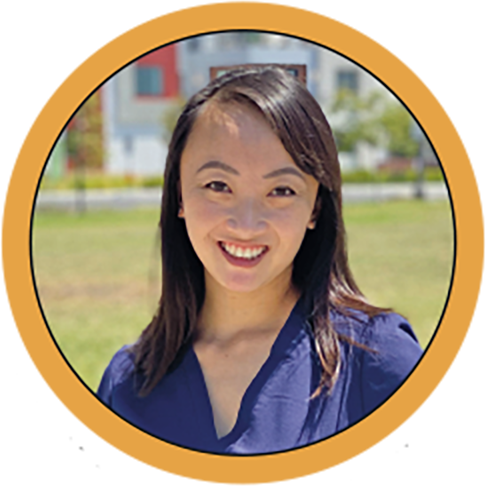
Tiffany Mosqueda ’13 DH, MPH, RDHAP 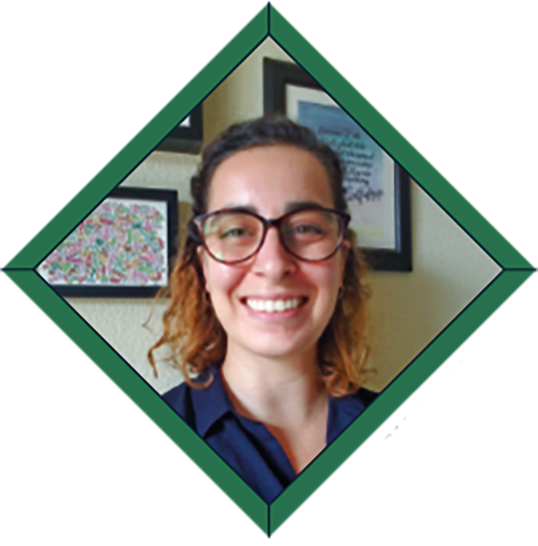
Dalia Lai ’14 DH
Once you begin working, you’re pretty much in your little office bubble, and having a network of professionals to relate to and learn from has been invaluable.
Advocacy is a compelling inspiration for Michael Long, BSDH, RDHAP. Long, a part-time dental hygiene faculty member at the Dugoni School, is active in both SFDHS and CDHA, where he is chair of the CDHA Foundation, the organization’s 501(c)(3) fundraising arm. With SFDHS, he’s worked closely with the San Francisco Department of Public Health to improve access to oral health care for children, expectant mothers and individuals experiencing homelessness. “Through these roles, I’ve been able to help shape policies, advocate for the profession and elevate the role of dental hygienists in public health,” he says.
In 2023, Long was appointed to the Dental Hygiene Board of California, where he contributes to overseeing dental hygiene education, licensing and scope of practice—ensuring that the profession continues to evolve to meet the needs of both providers and the public.
Another Dugoni School hygiene faculty member making a mark on organized dentistry is Michael LaFlamme, who currently serves as president of the San Francisco Dental Hygiene Society. “What students often don’t realize is that after they leave the school’s Dental Hygiene program, they’ll lose the camaraderie and professional connection they currently share with their classmates, dental students and instructors,” says LaFlamme. “It’s rare to find that same sense of community in an office with just a few hygienists—and even less likely if you’re the sole hygienist. The best option is to stay connected to your professional organization and peers. This connection offers valuable networking opportunities and access to seasoned RDHs, who can provide guidance and open doors to opportunities you might otherwise miss.”
The CDHA offers members tangible benefits—such as continuing education, symposiums, insurance, financial planning and even W-2 benefits and protections. But the broader advantages of membership are community and professional networking. “Personally, I’ve found that CDHA has been a great launch pad to connect with professionals involved in aspects of dental hygiene other than just clinical work,” says Gomez. “I always tell potential members that you get what you put into it—and the possibilities are endless.”
This connection offers valuable networking opportunities and access to seasoned RDHs, who can provide guidance and open doors to opportunities you might otherwise miss.
The high caliber of students who decide to pursue an education at the Dugoni School of Dentistry are often looking for professional growth opportunities beyond that of basic licensure, observes Lai, and being a part of a statewide organization is the perfect place for those graduates to make themselves into more well-rounded and competitive dental professionals who stand out to employers. “With opportunities to get involved in public health programs, research and policymaking at the local and state levels, Dugoni School graduates will find that they belong anywhere and everywhere, not just in private practice,” she says.
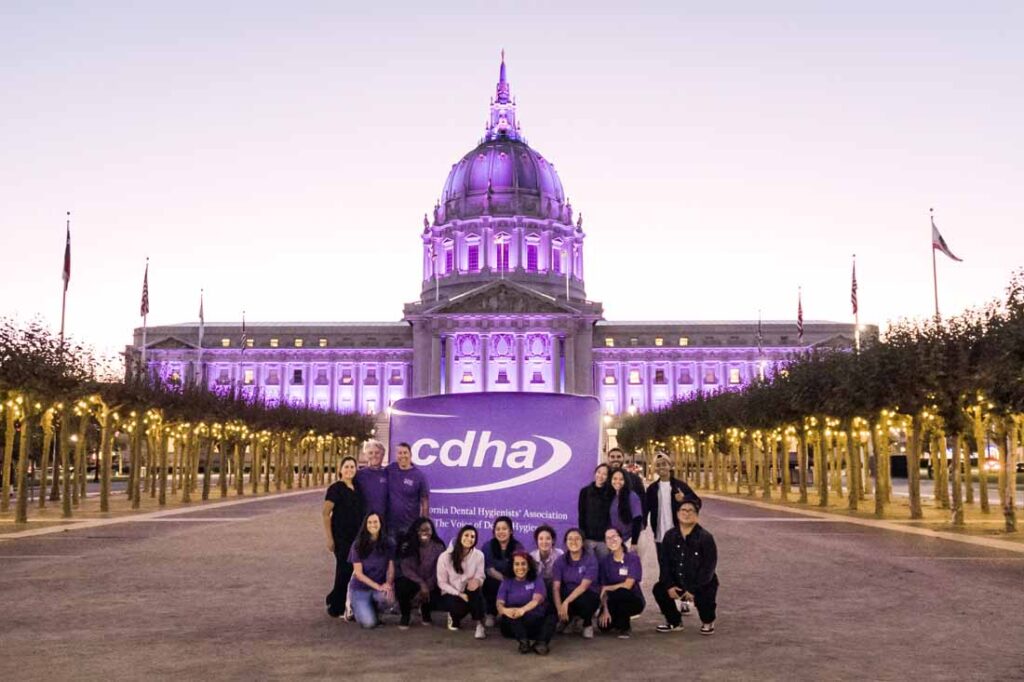
CDHA members celebrate Dental Hygiene Month in San Francisco
Long agrees. “CDHA offers mentorship and inspiration, connecting experienced professionals with emerging dental hygienists to foster a strong, engaged workforce,” he says. “It also provides continuing education and skill development, granting access to the latest research, best practices and educational resources that help clinicians stay current with evolving standards of care.”
Getting and staying involved in these organizations isn’t just about advancing one’s own career however; it’s about protecting and enhancing the future of the profession. “We put so much time and money into our education that we must protect what we’ve worked so hard for,” says Mosqueda. “Many states are allowing dental assistants or foreign-trained dentists to provide the care we’ve spent years studying for. If this continues, the dental hygienist’s role might cease to exist and our patients won’t receive the high level of care they deserve. CDHA also works to expand our profession, such as creating the Registered Dental Hygienist in Alternative Practice (RDHAP) license.”
CDHA offers mentorship and inspiration, connecting experienced professionals with emerging dental hygienists to foster a strong, engaged workforce.
“No one handed us the RDHAP licensure, the CDHA had to work for it,” says Lai. “No one was going to advocate for the student-faculty ratio to be codified to promote the competency of our future hygienists. The CDHA had to work for it. No one is going to hand us fair pay and benefits, we have to communicate our value and advocate for it. And while we could pursue this on an individual level, we can go farther together!”

California Deputy Attorney General Brian Gerard Armstrong, Michael Long, Chair of the CDHA Foundation, State Senator Scott Wiener, Allison Wagstaff ’18 DH, CDHA Government Relations Council member and Angela Gomez ’14 DH, CDHA president-elect
In addition to its Dental Hygiene program, the Dugoni School also offers an RDHAP virtual program approved by the Dental Hygiene Board of California where RDH’s can receive the 150-hour educational training required to apply for the RDHAP license in California.
“Staying involved and demonstrating leadership in the broader dental community is essential to ensuring the profession continues evolving safely, effectively and with a vision toward the future,” says Long. “Visibility plays a crucial role—whether through in-person engagement, social media advocacy, attending meetings or contributing to professional journals. By actively participating, we can help shape the future of dental hygiene while strengthening our collective voice.”
Clearly, for the individual, for the dental school and for the profession at large, these organizations serve a higher purpose. “One of the most surprising and inspiring aspects of my involvement with CDHA has been witnessing its members’ incredible passion and dedication,” says Long. “The dental hygiene professionals within this organization are deeply committed to advancing the profession, often going above and beyond to advocate for positive change.”
“I’ve met some of the brightest minds in dentistry through the CDHA,” says Laughter. “The benefit to our alumni is the availability of affordable continuing education. The benefit to the organization is a line of succession to leadership positions of graduates who understand collaboration and teamwork. Dugoni School graduates possess those skills.”
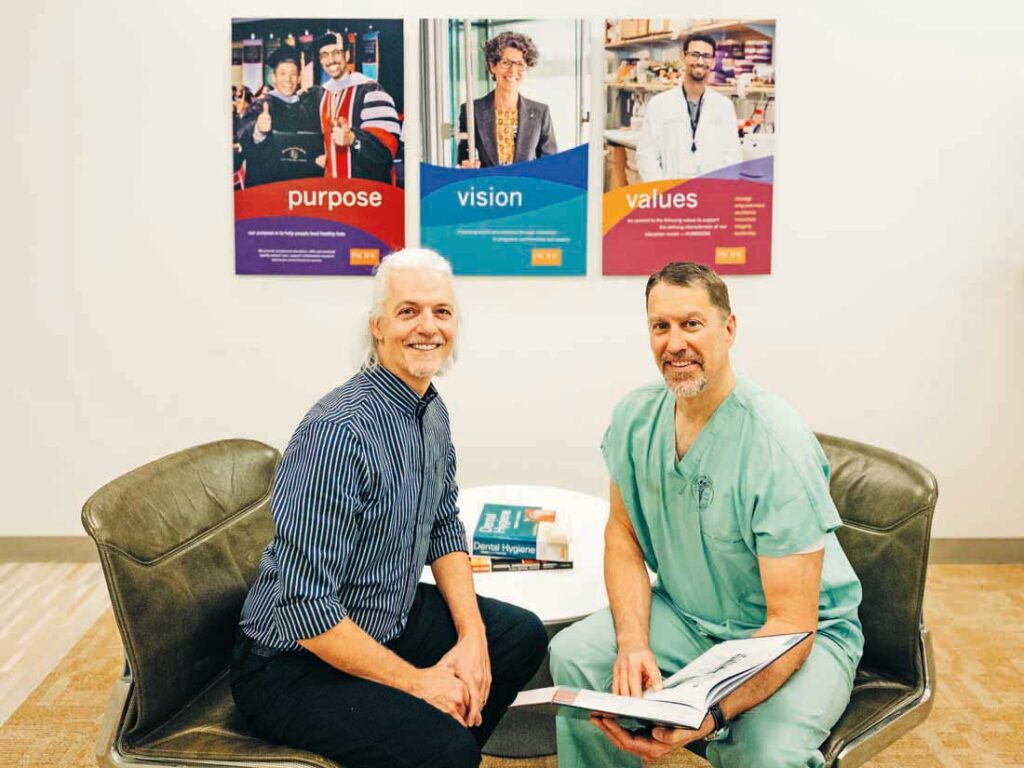
Michael Long and Michael LaFlamme at the Dugoni School 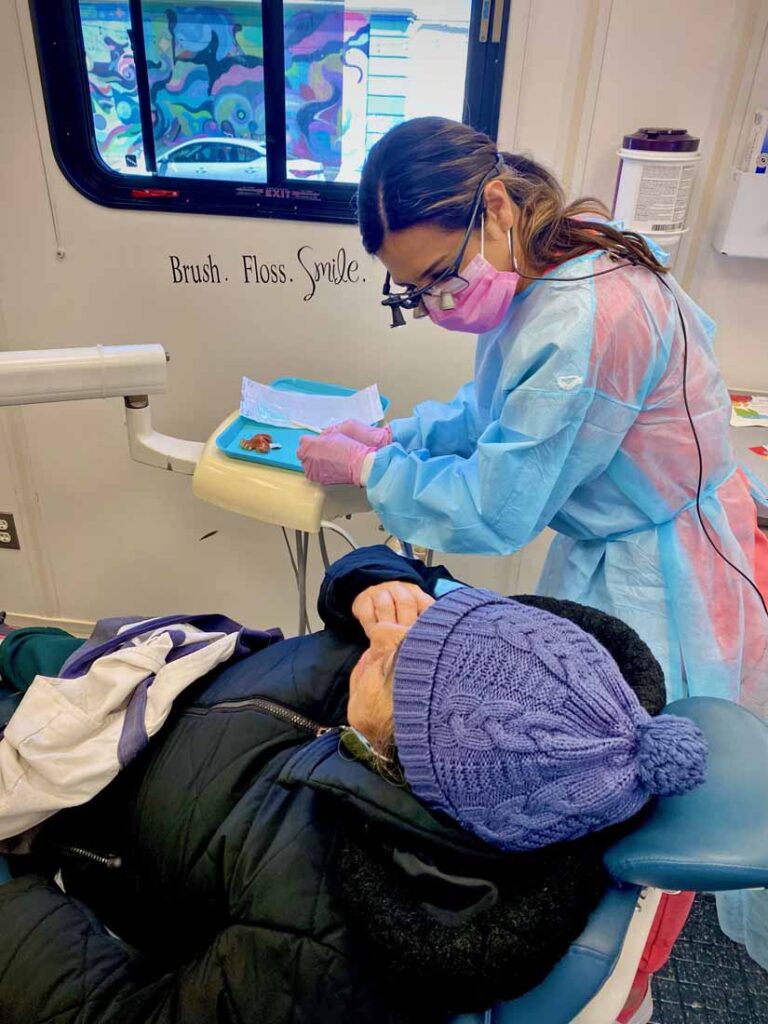
Angela Gomez ’14 DH volunteers at a community outreach program 
Michael Long and Michael LaFlamme at the Dugoni School 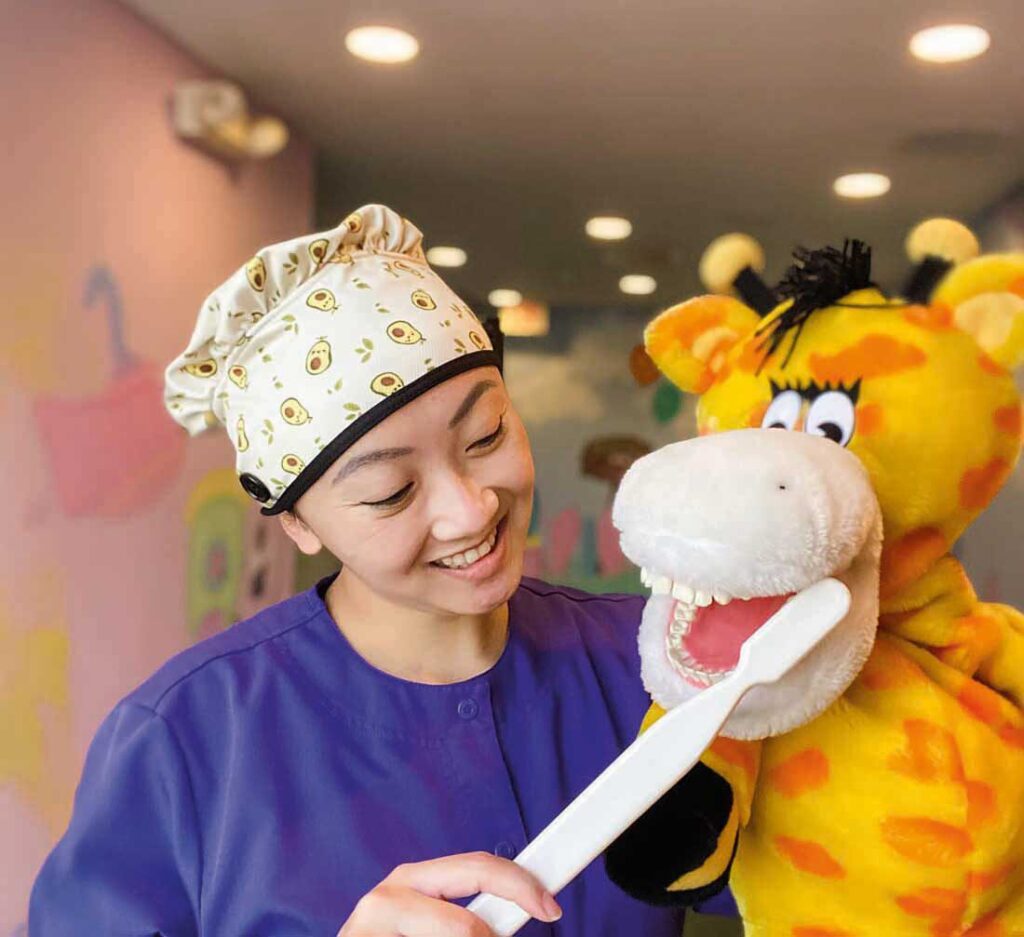
Tiffany Mosqueda ’18 DH demonstrates proper brushing technique to children
Kirsten Mickelwait is a San Francisco-based copywriter, content provider and professional storyteller.